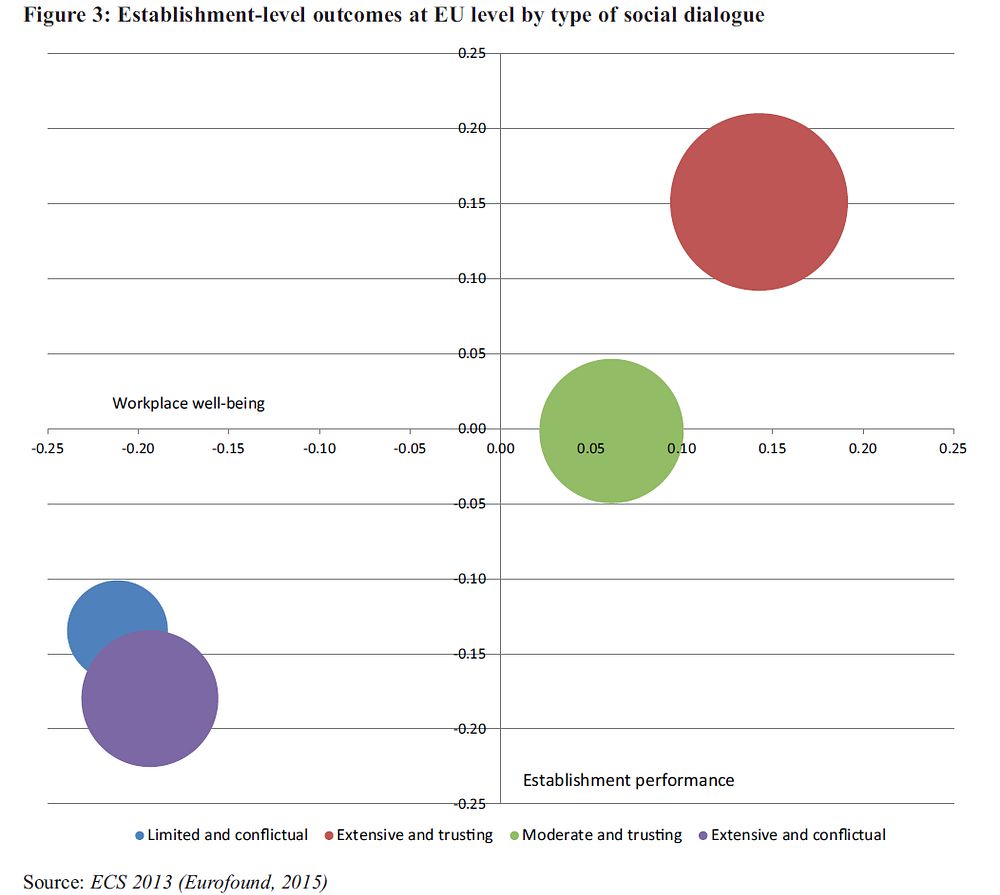Trust and dialogue are the secrets to business success in times of crisis
Europe has gone through significant economic change over the past decade. Businesses have had to manage the challenges posed by the financial crisis, globalisation and a rapidly changing labour market. Eurofound's new report Win-win arrangements: Innovative measures through social dialogue at company level has shown that new challenges do not always require radical new approaches , and that innovation can be found in the full implementation of well-established positive workplace practices.
Europe has gone through significant economic change over the past decade. Businesses have had to manage the challenges posed by the financial crisis, globalisation and a rapidly changing labour market. Eurofound's new report Win-win arrangements: Innovative measures through social dialogue at company level has shown that new challenges do not always require radical new approaches, and that innovation can be found in the full implementation of well-established positive workplace practices. Concretely, it shows that companies that are engaged in well-functioning social dialogue with employees are better equipped to implement the reforms needed in order to increase their competitiveness, retain or source the necessary skills, boost employee performance and safeguard or increase employment. Companies that develop this close dialogue with employees also prove to be more resilient to challenges posed by competition and changing markets.
The report looks specifically at the way companies respond to internal and external challenges and how social dialogue contributes to finding solutions that work for both the organisation and the employees. The report samples 20 companies from five EU Member States, and provides a snapshot of company-level social dialogue and how different companies are engaging with their employees. It contains useful and relevant information for political decision-makers, employers, and employee representatives alike.
Following the financial crisis many companies throughout Europe had to implement reforms in order to retain their competitiveness, these included the reduction of operating costs, incorporating new technologies, changing the scope of their business, outsourcing, changing terms of employment, and changes in work organisation. The success of these measures was often determined by the way in which they were implemented and the existing relationship between management and employees. Companies that register the most positive outcomes, for both organisations and employees, as reported by managers and employee representatives, were engaged in continuous dialogue with employees, sought regular feedback from management and staff on new policies, and provided training to manage modified terms of employment where necessary. In other words, workplace reforms were introduced by fostering new strategies, rather than forcing them.

The report looks extensively at the relationships between social dialogue, workplace well-being and establishment performance.
Trust is a characteristic of firms who appear to register more mutual benefits for organisations and employees. There is no recipe for creating trust, but there are certain conditions that favour its emergence. These include: mutual recognition and respect for the two parties in charge of finding solutions to common challenges that the organisation faces, a timely intervention that allows room for meaningful discussion, transparency, and the involvement of all relevant parties in the development of strategies and objectives. Forward planning from HR and operations managers in preparing an organisation and its workforce for market change was also highlighted as an important factor, as well as providing fair and adequate support for employees who are made redundant.
The European Commission has recognised the importance of social dialogue for Europe's economy, as well as the deterioration of social dialogue in some quarters due to the economic crisis. It is therefore important to showcase the mutual benefits of strong-social dialogue within companies, both at national and European level. Company-employee relations are generally tense during periods of economic crisis, and changes in the market and competition. This report, however, demonstrates that positive social dialogue at company level is mutually beneficial, and can reap dividends for workers, businesses, and the broader European economy.
Related links
Publication: Win–win arrangements: Innovative measures through social dialogue at company level
Author
Stavroula Demetriades
Senior research managerStavroula Demetriades is a senior research manager in the Employment unit at Eurofound. She has responsibility for research in the areas of the green and just transition, social dialogue, management practices, innovation and hybrid work. She holds a PhD in Sociology from the University of Aalborg, Denmark. She also has an MSc in Economic Policies from Trinity College Dublin and an MSc in Regional Development from Athens University. Prior to joining Eurofound in 1999, she worked in research institutes, in different posts in the public and private sectors, and conducted organisational and socioeconomic studies. Her main research interests include the green and just transition, human resource management, work systems, innovation, employment and social dialogue. She is also adjunct professor in the Business School at University College Dublin.
Related content
6 September 2016
Well-functioning social dialogue is a key component for the successful design and implementation of reforms needed to increase the competitiveness of Europe’s economies and create more jobs. It balances workers’ and employers’ interests and contributes to both economic competitiveness and social cohesion. The link between social dialogue and productivity and competitiveness has been the subject of much research, particularly since the advent of the economic crisis in 2008. In some countries, decentralised bargaining is part of a coordinated system, but in others key aspects of coordinated social dialogue, such as company-level worker representation, are missing. This report identifies how management, employees and their representatives find common solutions to common problems. It also describes the measures, especially innovative approaches, that have been established through social dialogue in response to new workplace challenges.
